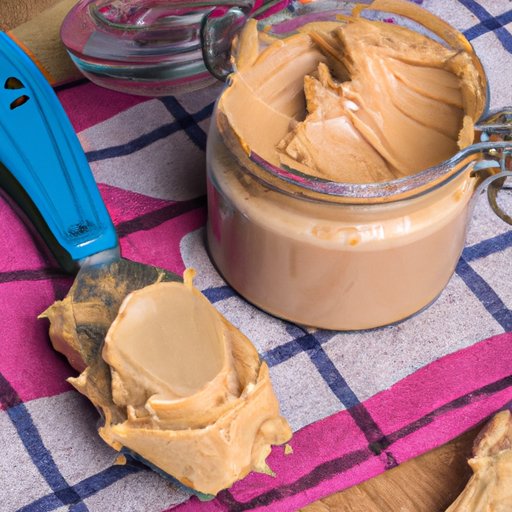
How Much Peanut Butter Per Day to Gain Weight: A Comprehensive Guide
Gaining weight can be a challenging process, and there are a variety of factors that can impact the amount of weight someone gains, including genetics, age, and lifestyle habits. However, for those looking to add pounds to their frame, one of the easiest and most delicious ways to do so is by incorporating peanut butter into their diet. In this article, we will explore how much peanut butter per day is best for weight gain, the benefits of peanut butter and protein for gaining weight, and how to incorporate peanut butter into your diet in a healthy and sustainable way.
The Benefits of Peanut Butter for Gaining Weight
Peanut butter is a nutrient-rich food that is packed with healthy fats, protein, and calories, which makes it an ideal food for weight gain. Just two tablespoons of peanut butter contain roughly 200 calories and eight grams of protein, making it an excellent choice for those looking to increase their calorie and protein intake.
There are two main types of peanut butter: natural and processed. Natural peanut butter is made from whole peanuts, while processed peanut butter often contains added sugar, oil, and preservatives. While both types can be a good source of nutrients, natural peanut butter tends to be the healthier choice, as it contains more fiber and fewer additives.

How Much Peanut Butter Per Day is Best for Weight Gain
The amount of peanut butter someone should consume per day to gain weight will depend on a variety of factors, including their activity level, body weight, and goals. However, as a general guideline, consuming one to three tablespoons of peanut butter per day can be a safe and effective way to increase calorie intake and support weight gain goals.
It’s important to note that while peanut butter can be a healthy and nutrient-rich food, consuming too much of it can lead to excess calorie intake and potential health risks. It’s important to be mindful of portion sizes and to balance peanut butter intake with other healthy foods to support overall health and weight gain goals.
Peanut Butter: A High Calorie Addition to Your Diet
Incorporating peanut butter into your meals and snacks can be an effective way to increase calorie and nutrient intake. Adding peanut butter to a smoothie, spreading it on toast, or dipping veggies in it can all support weight gain goals and boost nutrient intake.
When incorporating peanut butter into your diet, consider pairing it with other nutrient-dense foods to create balanced and satisfying meals. For example, adding peanut butter to a banana, spreading it on whole-grain bread, or dipping veggies in hummus can all provide a healthy and balanced snack that supports weight gain goals.
Is Too Much Peanut Butter Counterproductive to Weight Gain?
While peanut butter can be a healthy addition to your diet, consuming too much of it can be counterproductive to weight gain goals. Overconsumption of peanut butter can lead to excess calorie intake, which can contribute to weight gain in the form of fat rather than muscle mass. Additionally, some peanut butter brands may contain added sugar, salt, and preservatives, which can negatively impact overall health if consumed in excess.
To avoid overconsumption of peanut butter, it’s important to be mindful of portion sizes and to balance peanut butter intake with other healthy foods. Measuring out a serving size of peanut butter, spreading it on a piece of fruit or whole-grain bread, and savoring each bite mindfully can all help support healthy and sustainable weight gain.
Combining Peanut Butter with Other Foods for Optimal Weight Gain
To support optimal weight gain goals, it’s important to pair peanut butter with other nutrient-dense foods. This can include fresh fruits and vegetables, whole-grain bread or crackers, and high-quality protein sources such as chicken, fish, tofu, or beans.
When pairing peanut butter with other foods, consider the balance of macronutrients – protein, carbohydrates, and fat – to support optimal nutrient absorption and weight gain.
The Role of Protein in Peanut Butter for Weight Gain
Protein is a key nutrient for weight gain, as it provides the building blocks for muscle growth and repair. While peanut butter is not a complete protein source, as it does not contain all of the essential amino acids the body needs, it is still a good source of protein for weight gain. Pairing peanut butter with other protein sources, such as chicken or beans, can help ensure optimal protein intake for weight gain goals.
Research has also shown that plant-based protein sources, such as those found in peanut butter, can be just as effective for muscle growth and repair as animal-based protein sources. This makes peanut butter an excellent choice for vegetarians or those looking to reduce their meat consumption.
Peanut Butter: A Health-Conscious Way to Pack on Pounds
Overall, peanut butter can be a healthy and effective way to support weight gain goals. It’s packed with calories, healthy fats, and protein, and can be a delicious addition to meals and snacks. However, it’s important to be mindful of portion sizes and to balance peanut butter intake with other nutrient-dense foods to support overall health and weight gain goals.
Conclusion
Gaining weight can be a challenging process, but incorporating peanut butter into your diet can be a simple and delicious way to support this goal. By consuming one to three tablespoons of peanut butter per day, pairing it with other nutrient-dense foods, and being mindful of portion sizes, you can support healthy and sustainable weight gain.




